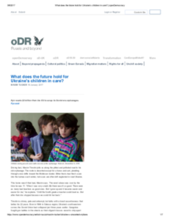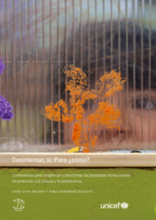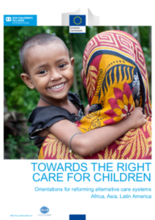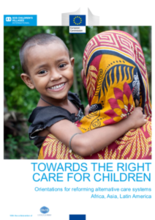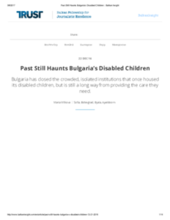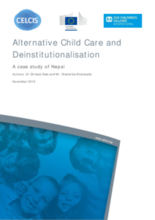Displaying 311 - 320 of 691
In this issue of ODR, Maxim Tucker details the deinstitutionalization challenges facing Ukraine
La publicación que se presenta pretende ser un aporte en desarrollando herramientas, metodologías de trabajo, y estrategias para desinternar a niños en distintos momentos vitales. A partir de la experiencia de trabajo y la reflexión sobre su propia práctica, La Barca ordena, sistematiza y pone a disposición de todos los actores del sistema de protección a la infancia los principales aprendizajes de la tarea realizada en los últimos años.
This newsletter issue from Senator Linda Reynolds of Western Australia, written in conjunction with Kate van Doore of Griffith Law School, was written in preparation for the Australian Parliamentary inquiry on modern slavery and describes the ways in which orphanage trafficking constitutes modern-day slavery.
This short animation tells the story of a young boy and girl forced to flee their homes, and how detention can be avoided in order to complete their migration status.
This synthesis report contains findings of a study that conducted research in six South and Central American, Asian and African countries for the purpose of gaining understanding of the nature, extent, and scope of institutionalization and the feasibility of deinstitutionlisation.
The general objective of this study was to conduct a research on the possible issue of institutionalisation in six South and Central American, Asian and African countries in order to strengthen the knowledge of the European Commission on the nature, the extent and scope of institutionalisation and feasibility of de-institutionalisation (alternative care for children).
Using national and international law, court observations, and field experiences, this paper argues a case for deinstitutionalization of children in India, by empowering the families, thereby protecting children's right to a family and preventing abuse and exploitation.
This abstract relays the findings of a survey on informal carers' views and opinions under the current conditions of social support in the Czech Republic.
This article discusses Bulgaria's challenges since the shut down of its crowded institutions, which housed disabled children.
The report investigates why children are placed into alternative care, what types of alternative care are available in Nepal, what structures and processes govern alternative care, how the alternative care workforce are trained and supported, and what is and is not working in Nepal's current system. It concludes with recommendations for enhancing alternative care in the country.

